A raw food diet involves eating unprocessed, uncooked plant-based foods such as fruits, vegetables, nuts, and seeds. This approach maximizes nutritional content, helping to retain essential vitamins, minerals, and enzymes that cooking can destroy. Health benefits often include improved digestion and increased energy levels, but be mindful of potential drawbacks like nutrient deficiencies, digestive discomfort, and food safety concerns. Various types of raw diets, such as raw vegan or raw omnivore, cater to different preferences. To start, you can gradually incorporate more raw foods into your meals. Discovering meal ideas and community support could enhance your experience even further.
Key Takeaways
- A raw food diet consists of unprocessed, uncooked plant-based foods, maximizing nutritional content from fruits, vegetables, nuts, and seeds.
- Health benefits include improved digestion, enhanced nutrient absorption, and increased energy levels from nutrient-dense foods.
- Key considerations include food safety, potential nutritional deficiencies, and social challenges that may arise from dietary restrictions.
- Transitioning to a raw food diet can be gradual by incorporating more raw ingredients and planning meals ahead for variety.
- Joining communities or online forums can provide support, motivation, and recipe-sharing opportunities to enhance the raw food experience.
What Is a Raw Food Diet?
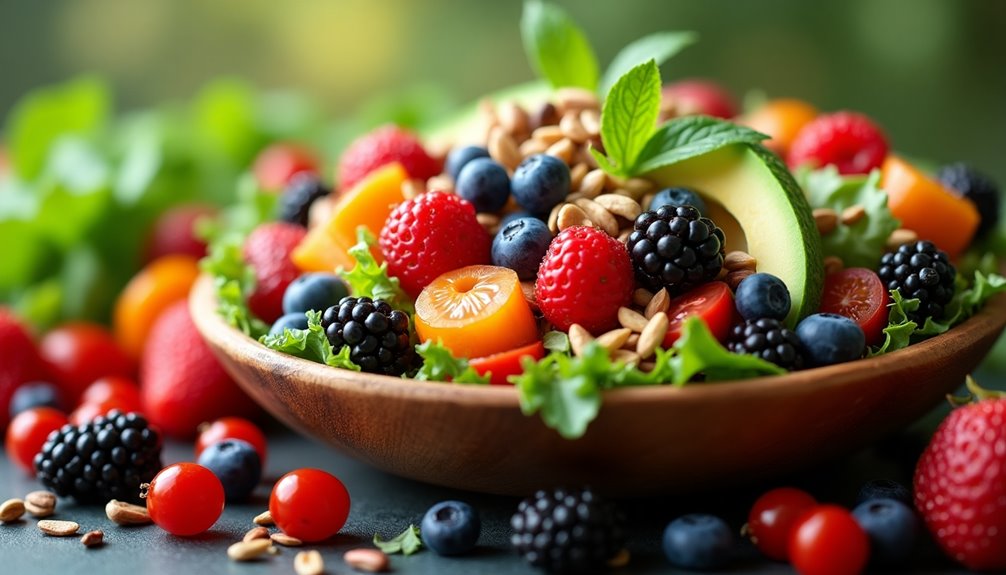
A raw food diet primarily consists of unprocessed, uncooked plant-based foods, and many proponents believe it offers numerous health benefits. By focusing on fruits, vegetables, nuts, seeds, and sprouted grains, you may find that this diet provides high nutritional value. Foods in their raw state often retain more vitamins, minerals, and enzymes, which can be beneficial for digestion and overall health. Eating a variety of these whole foods can help guarantee you're getting a rich array of nutrients.
However, when adopting a raw food diet, it's crucial to prioritize food safety. While fresh produce can be nutrient-dense, it can also harbor harmful bacteria if not handled correctly. Washing fruits and vegetables thoroughly, buying organic when possible, and maintaining proper storage conditions are essential steps to minimize risks.
It's also wise to be cautious with certain foods, like sprouts and unpasteurized juices, as they can be more prone to contamination.
As you explore this diet, you'll likely connect with a community that shares similar values around health and well-being. Many raw food enthusiasts emphasize the joy of preparing and enjoying meals that are vibrant and full of life. Engaging with others on this journey can provide a sense of belonging and support as you navigate the challenges and rewards of a raw food lifestyle. Incorporating whole food sources of protein into your meals can enhance the nutritional benefits of a raw food diet.
Balancing the nutritional benefits with food safety considerations will help you make informed decisions that contribute to your health and wellness.
Key Principles of Raw Food
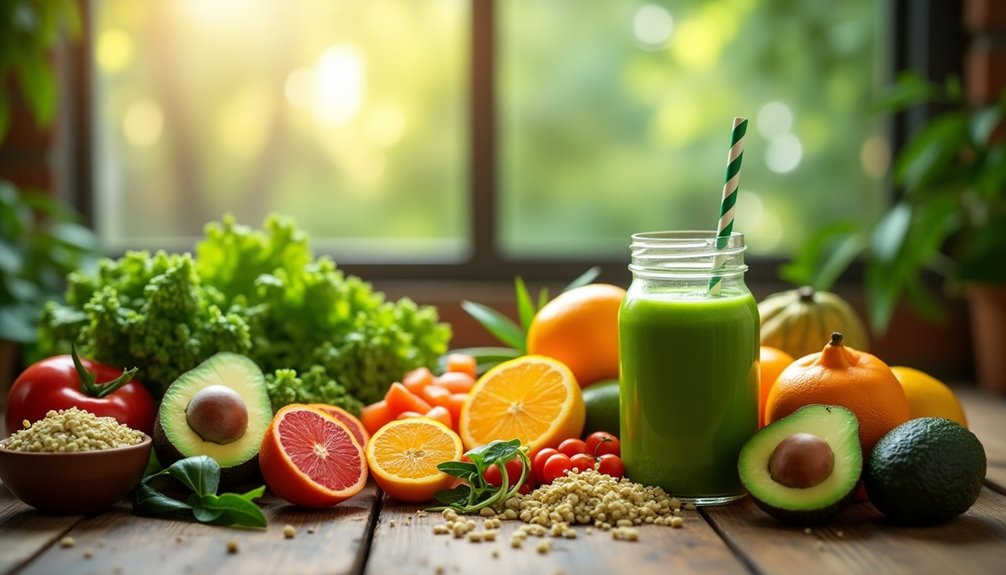
Understanding the key principles of a raw food diet can help you make informed choices that align with your health goals. At the heart of this lifestyle is the belief that consuming uncooked, unprocessed foods maximizes their nutritional content. Fresh fruits, vegetables, nuts, seeds, and sprouted grains are staples, as they retain essential vitamins, enzymes, and minerals that may be diminished through cooking.
Food safety is vital when adopting a raw food diet. Since you'll be eating many perishable items, it's important to select organic produce whenever possible to minimize pesticide exposure. Always wash fruits and vegetables thoroughly to remove contaminants. Storing food at appropriate temperatures can help prevent the growth of harmful bacteria, ensuring you enjoy the benefits of raw eating without compromising your health.
Balancing your meals is also crucial. While fruits and vegetables are packed with nutrients, you should include a variety of food types to meet your dietary needs. Incorporating nuts and seeds can provide healthy fats and protein, which are vital for overall well-being. Additionally, a plant-based diet offers significant health benefits, including lowering cholesterol levels and enhancing heart health.
Moreover, it's important to listen to your body. Making changes to a raw food diet can be a significant adjustment, and you might need time to adapt. Pay attention to how different foods make you feel and adjust your choices accordingly. By following these key principles, you create a foundation that supports not just your nutritional goals but also your sense of belonging within a community that values health and wellness.
Potential Health Benefits
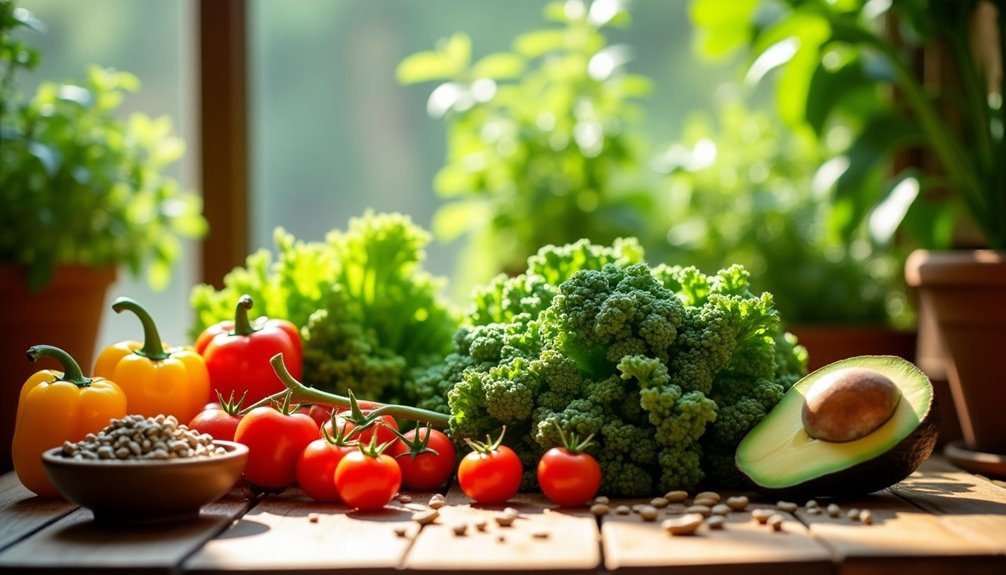
When you adopt a raw food diet, you may experience several potential health benefits that can enhance your overall well-being. This lifestyle encourages the consumption of uncooked fruits, vegetables, nuts, and seeds, which are packed with essential nutrients. One of the most significant advantages is improved digestion. Raw foods are rich in fiber, which can help your digestive system function more efficiently and promote regular bowel movements.
Additionally, the raw food diet may improve nutrient absorption. Cooking often reduces the nutrient content of foods, while raw options retain their vitamins and minerals, providing your body with excellent nutrition. This can lead to increased energy levels and improved overall health. Furthermore, a raw food diet can also support healthy recipes and meal ideas that complement your nutritional needs.
Here's a quick overview of some potential health benefits:
| Health Benefit | Description |
|---|---|
| Improved Digestion | High fiber content supports digestive health. |
| Enhanced Nutrient Absorption | Preserves vitamins and minerals for better utilization. |
| Increased Energy Levels | Nutrient-dense foods provide sustained energy.
Possible Drawbacks and Risks

While the raw food diet offers numerous potential health benefits, it's important to assess the possible drawbacks and risks associated with this eating approach. Many individuals who adopt a raw food diet may find themselves facing challenges that can impact their health and well-being.
Here are some key concerns to take into account:
- Nutritional deficiencies: Raw diets can lead to a lack of essential nutrients, such as vitamin B12, iron, and omega-3 fatty acids. These deficiencies can arise from the exclusion of animal products and certain cooked foods that provide these crucial nutrients.
- Digestive issues: Switching to a raw food diet can result in bloating, gas, or discomfort for some. The high fiber content in raw fruits and vegetables can be tough on your digestive system if you're not accustomed to it.
- Food safety: Consuming raw foods increases the risk of foodborne illnesses. Without proper cooking, harmful bacteria and parasites may remain, posing a health risk, especially for vulnerable populations.
- Social challenges: Handling social situations can become tricky when you're committed to a raw food diet. You may find it difficult to enjoy meals with friends and family, which can lead to feelings of isolation. Additionally, individuals on a raw food diet may be unknowingly missing out on nutritional benefits that come from cooking methods, which can enhance the bioavailability of certain nutrients.
Types of Raw Food Diets
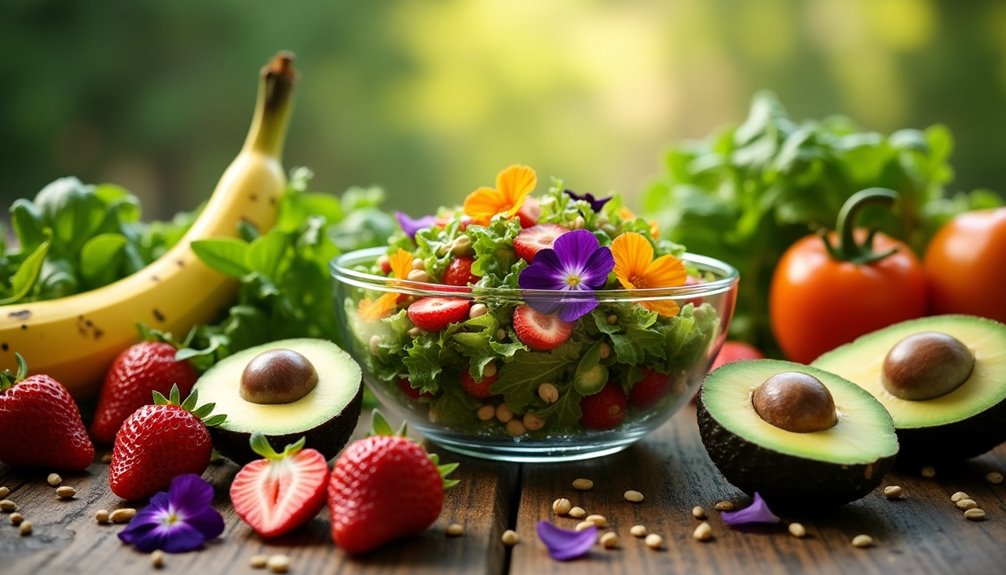
Raw food diets come in various forms, each catering to different preferences and health goals. You might encounter popular variations such as the fruitarian diet, which focuses primarily on fruits, or the raw vegan approach, eliminating all animal products while emphasizing plant-based foods. If you prefer a more inclusive option, the raw omnivore diet allows for raw animal products like fish, eggs, and dairy, in addition to fruits and vegetables.
Each type of raw food diet comes with its own set of nutritional concerns. For instance, while a raw vegan diet is rich in vitamins and antioxidants, it may lack essential nutrients like vitamin B12, iron, and omega-3 fatty acids. Additionally, adopting a plant-based diet can lead to improved health outcomes and a longer life, as evidenced by various studies.
On the other hand, a raw omnivore diet can provide a broader range of nutrients but may raise questions about food safety and the risks of consuming raw animal products.
It's essential to find a balance that works for you. Consider your nutritional needs and preferences when choosing a raw food diet. Engaging with a community of like-minded individuals can provide support and resources as you explore these diets. Whether you're drawn to the vibrant colors of fresh produce or the simplicity of whole foods, understanding the various types of raw food diets will help you make informed choices that align with your health goals. Remember, it's about finding what resonates with you while ensuring you meet your nutritional needs.
Tips for Transitioning
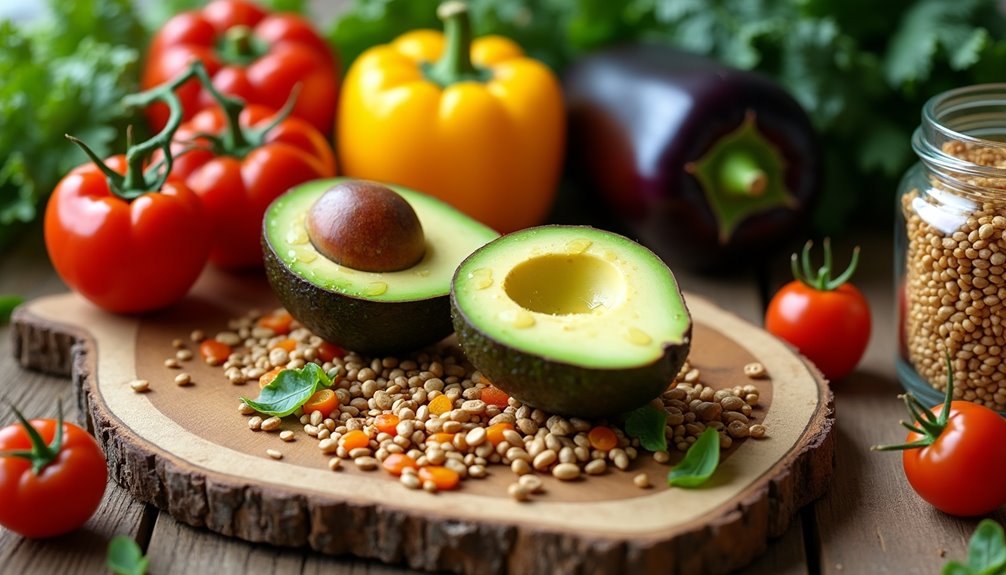
Shifting to a raw food diet can be both exciting and challenging, as it often involves significant changes to your eating habits. To make this shift smoother, consider the following tips that can help you feel more comfortable and confident in your choices.
- Start Slow: Begin by incorporating more raw fruits and vegetables into your meals. Gradually increase the percentage of raw foods in your diet over time to avoid overwhelming yourself.
- Meal Planning: Plan your meals ahead of time. This not only helps you stay organized but also guarantees you have a variety of raw foods available. Create a weekly menu that includes different fruits, vegetables, nuts, and seeds to keep your meals interesting and nutritious.
- Invest in Kitchen Equipment: Having the right tools can make a significant difference in your raw food journey. Invest in a good blender, food processor, and spiralizer to help you create a range of delicious dishes with ease.
- Join a Community: Connect with others who share your interest in raw foods. Whether it's through online forums, social media, or local groups, having a support network can provide motivation, share ideas, and inspire you throughout your shift. Additionally, exploring variety in meal planning can enhance your experience and keep your diet enjoyable.
Recipes to Try

Exploring new recipes can make your shift to a raw food diet not only enjoyable but also rewarding. One delightful option to ponder is smoothie bowls. They're an excellent way to combine your favorite fruits, leafy greens, and even nuts or seeds.
Start with a base of blended bananas, spinach, and almond milk. Then, top it with fresh berries, chia seeds, and granola for added texture and nutrients. This vibrant dish not only looks appealing but also provides a nutritious breakfast or snack that can energize your day.
Another fantastic recipe to try is energy balls. These no-bake treats are simple to prepare and perfect for on-the-go snacking.
Combine dates, nuts, and a dash of cocoa powder in a food processor. Roll the mixture into bite-sized balls, and you've got a wholesome snack that's both satisfying and full of energy. You can add variations by mixing in coconut flakes, oats, or even a scoop of protein powder, tailoring them to your taste.
Both smoothie bowls and energy balls offer versatility, allowing you to experiment with different ingredients based on your preferences. As you explore these recipes, you'll find that they not only nourish your body but also create a sense of community. Additionally, incorporating fresh, whole fruits and green smoothies can benefit diabetics and support overall health.
Sharing your creations with friends or family can strengthen your connection to others who appreciate the benefits of a raw food lifestyle. So, gather your ingredients and get started on this exciting culinary journey!
Frequently Asked Questions
Can Children Safely Follow a Raw Food Diet?
When considering if children can safely follow a raw food diet, it's important to evaluate their nutritional needs. Kids require a balanced intake of vitamins, minerals, and protein for proper growth and development. While raw foods can be nutritious, they mightn't provide all essential nutrients in sufficient amounts.
It's important to consult a healthcare professional to guarantee your child's diet supports their health and development while meeting their unique needs.
How Does a Raw Food Diet Affect Athletic Performance?
Did you know that athletes who consume a balanced diet rich in whole foods can absorb up to 90% of nutrients?
If you're considering a raw food diet, it could potentially enhance your energy levels due to high nutrient absorption. However, some may struggle with getting enough calories and protein, which are essential for peak performance.
Balancing raw foods with other nutrient sources might be key to sustaining your athletic endeavors effectively.
Is It Necessary to Wash Raw Foods Thoroughly?
Yes, it's important to wash raw foods thoroughly to guarantee food safety. Washing helps remove dirt, bacteria, and pesticide residues that could compromise your health. While you may enjoy the nutritional benefits of fresh produce, unwashed items can pose risks.
Can I Still Eat Raw Food While Dining Out?
You can definitely enjoy raw food options while dining out! Look for restaurants that emphasize fresh ingredients or offer a salad bar. It's smart to ask your server about raw dishes on the menu. Consider dining out during off-peak hours for a more personalized experience, allowing you to discuss your dietary preferences.
What Kitchen Tools Are Essential for a Raw Food Diet?
To create delicious, vibrant meals, you'll need some key kitchen tools.
A food processor is essential for chopping and mixing ingredients effectively.
A high-quality blender helps you whip up smoothies and soups effortlessly.
A dehydrator allows you to create crunchy snacks, while a spiralizer transforms vegetables into fun noodles.
With these tools, you'll enhance your culinary experience and enjoy experimenting with textures and flavors, making your kitchen a hub of creativity and nourishment.
Conclusion
Incorporating raw foods into your diet can be a revitalizing way to nourish your body and explore new flavors. While the benefits are appealing, it is crucial to approach this lifestyle with a balanced mindset, considering both its advantages and potential challenges. By slowly adapting and trying out delicious recipes, you can uncover a vibrant world of nutrition that may just ignite a newfound appreciation for wholesome ingredients. Embrace the journey, and enjoy every bite along the way!



